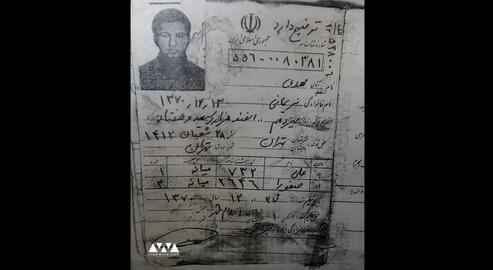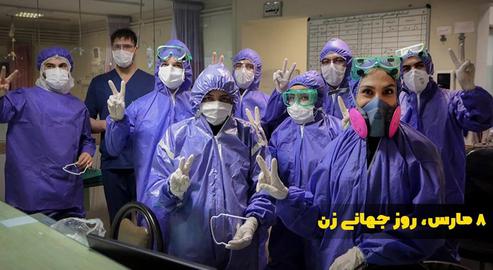Mehdi Narimani, a young man imprisoned in Greater Tehran Penitentiary for not being able to pay his wife’s dowry, had his 30th birthday on Wednesday, March 3. Three days later he died due to medical neglect.
The young inmate was unwell and had been given the wrong medication by prison staff. When he lost consciousness, the lack of resuscitation equipment onsite meant he was transferred to hospital, but it was already too late. Family members are now being told that the cause of Mehdi’s death was either “unknown”, an overdose or suicide: all versions of events they find impossible to believe.
***
Mehdi Narimani turned 30 on March 3. Like any other day in Greater Tehran Penitentiary, he was not able to spend any part of it with his family to mark the occasion. But three days later, his body was delivered to them from Firouzabadi Hospital.
The young man did not smoke and took care of himself, and those who knew him described him as an athlete. But he had become unwell and fellow prisoners say his physical condition had worsened on the Saturday morning. Due to the lack of facilities at Greater Tehran Penitentiary he was finally taken to hospital on their insistence. By the time he arrived at Firouzabadi Hospital at 8am, he was already unresponsive.
At about 10,30am that morning, Mehdi’s sister received a call from the hospital to tell her that her brother had died. According to a hospital staff member, who is in touch with the family, his death was confirmed within five minutes of arrival.
Who Was Mehdi Narimani?
Mehdi had no higher education. According to his cousin Mostafa, he was unemployed. He had been convicted of financial crimes four years ago after failing to pay a dowry of 25 million tomans (US$1,009) to his ex-wife, and had lost his mother to stomach cancer just three months after being jailed. His father had since remarried.
Two family members told IranWire that Mehdi had long been hoping for release, and would constantly contact prison staff to find out about the conditions. He had been working in the prison to earn extra money, and from time to time family members would send him some cash. Attempts to secure early release for him had been ineffective and some family members were trying to raise the money for the dowry themselves.
Mostafa said that his close relatives had not regularly checked in on him. “Mehdi’s aunt tried to get the consent of her ex-wife [to pursue the authorities],” he said, “but no one agreed until after Mehdi's body was returned to us. If his mother was alive, she wouldn’t have allowed this even for one day.”
They also confirmed that Mehdi had had no underlying health conditions. It is not clear why he fell ill, but what happened next almost certainly made it worse. A prison medical worker told IranWire: “We don’t have the necessary medication at our disposal. There is a plan in place here called ‘equivalent medicine’: if a prisoner gets sick and is undergoing treatment, we find a medicine similar to the one prescribed and give it to him instead. The equivalent and its dosage is prescribed by the nurses.
“Mehdi Narimani had been in a bad way for some time. But there was no doctor in prison to look after him, because across the Greater Tehran Penitentiary, despite it having five sub-prison complexes, there is only one doctor on each shift. The wrong medicine was given to Mehdi and his general condition worsened, and he died due to the lack of resuscitation equipment."
A Grieving Family’s Disbelief
Mehdi 's cousin Mostafa says that when the family received his body the cause of death should have been stated at the time. But the "unknown" option was selected on the form, and it has since been suggested to them that he either died of an overdose or had killed himself.
"Mehdi was an athlete,” he emphasizes. “He was not a smoker, let alone a drug addict. He did not commit suicide. He always hoped to be release, and we had told him that we were collecting the 25 million tomans. “
While he concedes that Mehdi might have become depressed due to the lack of visitors, Mostafa says they spoke regularly and he would have known if Mehdi was struggling. “Whatever it was, he would have told me. He even talked to me about the poor conditions in prison, and how one week they were given bad-quality chicken.”
Mehdi’s close family and his ex-wife’s family, Mostafa says, had obstructed other relatives’ attempts to contact the prosecutor to pursue the case. Mehdi did not have so much as a birth certificate and had destroyed his identity card during the dispute with his ex-wife. But now, all that remains of him is a grave. “Our main sadness,” says Mostafa, “is that they do not tell us the real reason for his death; the truth.”
Injustice Arising from Injustice
Last autumn, Ebrahim Raeisi, the head of the judiciary, said in a public statement about dowry payments that people who were provably not in a financial position to pay “should not go to prison”. Despite this, Mehdi Narimani had been jailed on this pretext, and despite his family’s efforts he had not been granted a reprieve.
The subject of dowries is complex in Iran. Many oppose the principle, and similarly believe that imprisonment for non-payment is unfair. But some women's rights activists also believe that in a society weighted against women such as the Islamic Republic, dowries are an integral source of support for women after a divorce. The climate created by the legislators in the Islamic Republic is therefore impossible: women are considered inferior and therefore are in need of a dowry, and men are then imprisoned for being unable to pay it.
Mehdi Narimani was not a political prisoner facing deliberate ill-treatment from the authorities. But their negligence killed him nonetheless.
"Mehdi died young,” Mostafa says. “He was an honorable man. I hope we can tell the truth about this, so that perhaps fewer people will lose their lives so cheaply."
visit the accountability section
In this section of Iran Wire, you can contact the officials and launch your campaign for various problems



























comments